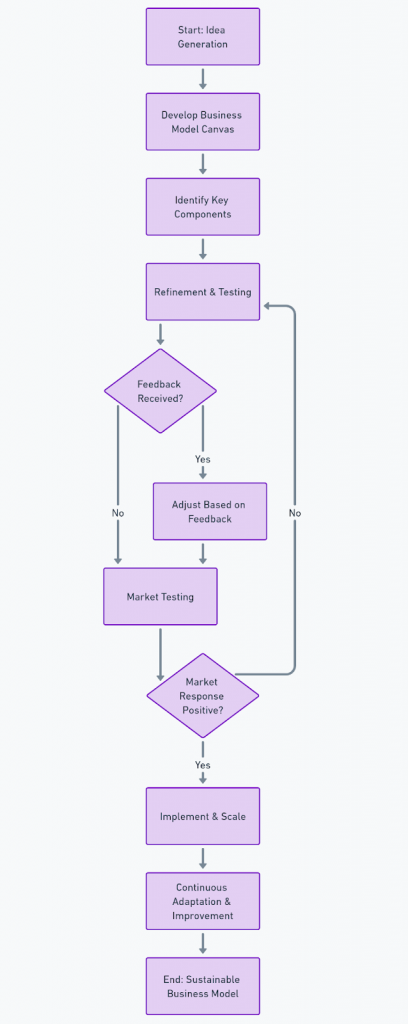The journey into entrepreneurship is akin to setting sail into uncharted waters, propelled by an intrinsic drive to bring visions to life. This adventure begins with a spark—a unique blend of passion, innovation, and a commitment to sustainability that defines the essence of modern entrepreneurship. It’s about seeing beyond the horizon, identifying opportunities for innovation that not only promise business success but also contribute positively to our world. As we embark on this exploration, we’ll delve into how aspiring entrepreneurs can transform their nascent ideas into thriving, sustainable businesses. The path is lined with challenges, but with the right mindset and tools, these obstacles become stepping stones towards achieving entrepreneurial excellence.
The Seed of Innovation
At the core of every successful business lies a simple yet powerful idea designed to meet specific customer needs. Take HelloFresh and Airbnb as prime examples. HelloFresh tapped into the need for convenience in meal preparation, transforming the chore of grocery shopping and meal planning into an enjoyable experience. Similarly, Airbnb revolutionized the way we travel by addressing the scarcity of affordable lodging options during peak events, creating a platform that connects homeowners with travelers seeking unique accommodations. These businesses exemplify how identifying and addressing underserved needs can lead to remarkable growth and success. For aspiring entrepreneurs, the lesson is clear: innovation begins with a keen understanding of your potential customers’ pain points and devising creative solutions to address them.
Mentorship and Mastering Business Skills
The Power of Mentorship
Navigating the entrepreneurial landscape can be daunting, but you don’t have to do it alone. Finding and engaging with experienced mentors is a crucial step towards shaping your entrepreneurial journey. Mentors bring a wealth of knowledge and insights, offering guidance through the complexities of starting and running a business. Whether it’s through networking events, industry conferences, or professional organizations, connecting with individuals who have walked the path before you can illuminate your way forward, helping you avoid common pitfalls and leverage opportunities you might not have seen.
Mastering Essential Business Skills
Beyond the inspiration and advice mentors provide, success in entrepreneurship demands a mastery of a core set of skills. Sales and marketing stand at the forefront, requiring a deep understanding of your target audience and the ability to craft messages that resonate and convert. In today’s digital age, this often means leveraging social media, content marketing, and email campaigns to build brand awareness and nurture customer relationships.
Equally important is the art of financial management and budgeting. Keeping a close eye on your cash flow, understanding how to budget for growth, and making informed financial decisions are foundational skills that can make or break your venture. It involves regular reviews of financial statements to ensure your business remains on a stable and profitable course.
Lastly, but perhaps most critically, are communication and leadership skills. The ability to clearly articulate your vision, motivate your team, and build meaningful relationships with stakeholders is paramount. This includes honing your presentation skills, practicing active listening, and fostering an environment of open feedback and collaboration. Effective leaders inspire, guide, and empower their teams towards collective goals, creating a culture where innovation thrives and challenges are met with resilience.
Building a Resilient Business Model

Crafting Your Foundation with the Business Model Canvas
In the entrepreneurial toolkit, the Business Model Canvas shines as a beacon for turning abstract ideas into structured, actionable business opportunities. Conceived by business theorist Alexander Osterwalder, and further advocated by experts like Peter Vogel, this strategic template allows you to visualize your business model in a comprehensive yet succinct manner. It breaks down your venture into key components—value proposition, customer segments, channels, revenue streams, and more—providing a clear overview of how each part interconnects and contributes to your business’s overall success.
Refinement and Testing: The Path to Viability
Creating a business model is just the beginning. The real magic lies in the continuous cycle of refinement and testing. This iterative process is essential for identifying the most viable path forward. It involves gathering feedback from potential customers, adjusting your offerings based on this feedback, and constantly testing the market’s response. Through this, you not only ensure your business model’s feasibility but also its adaptability—a crucial factor in today’s ever-changing market landscape.
Embracing Digital Marketing and Customer-Centric Sales Strategies
The Digital Marketing Edge
In the age of digital omnipresence, mastering digital marketing is no longer optional. It’s about crafting a narrative that resonates with your audience and spreading it across the channels they frequent. Effective digital marketing strategies involve a blend of creativity and analytics—using engaging content to attract attention, while also leveraging data to tailor and optimize your marketing efforts. Social media platforms, email marketing, content marketing, and SEO are just the tip of the iceberg. The goal is to create a digital presence that not only reaches your target audience but engages them in a meaningful way, fostering a community around your brand.
Customer-Centric Sales: The Heart of Growth
At the core of every successful business is a steadfast commitment to customer satisfaction. This commitment must permeate every aspect of your sales strategy. From understanding the unique needs and pain points of your target market to tailoring your sales pitch to meet these needs, every interaction should be designed to enhance the customer experience. Incorporating storytelling, offering personalized solutions, and ensuring transparent communication are all critical elements. Remember, the aim is not just to sell a product or service but to build lasting relationships with your customers, turning them into advocates for your brand.
Operational Efficiency and Strategic Scaling
Streamlining for Success
Operational efficiency is the backbone of any thriving enterprise. It’s about doing more with less—optimizing processes, reducing waste, and leveraging technology to automate and streamline tasks. Effective management of day-to-day operations allows you to deliver your value proposition more effectively, enhancing your ability to meet customer expectations consistently. Implementing systems for efficient workflow, task delegation, and performance monitoring can significantly improve your operational efficiency, setting a solid foundation for growth.
Scaling with Precision
Growth is an exciting goal, but strategic scaling is what ensures this growth is sustainable. This involves carefully evaluating market demand, identifying new opportunities, and methodically expanding your offerings or market reach. Monitoring key performance indicators (KPIs) like revenue growth, customer acquisition rates, and operational efficiency provides invaluable insights that guide your scaling efforts. Technology plays a pivotal role here, offering tools that support efficient scaling, from cloud-based services that grow with your business to analytics platforms that offer real-time insights into performance. The aim is to grow not just quickly, but wisely—ensuring that each step towards expansion is backed by a clear strategy and the operational capacity to support it.
Financial Acumen and Risk Management
Steering Through Financial Waters
Mastering the financial aspects of your venture is akin to navigating through treacherous waters, requiring both precision and foresight. Budgeting and cash flow management stand as the twin pillars supporting the financial health of your business. A well-structured budget acts as a roadmap, guiding your allocation of resources towards growth opportunities while ensuring operational costs are kept in check. Meanwhile, vigilant cash flow management ensures you maintain the liquidity necessary to meet your obligations and seize opportunities as they arise. Regular consultations with financial advisors can provide deeper insights into financial strategies, helping you to anticipate future challenges and sculpt a robust financial plan.
Shielding Against the Unknown
Risk management is not about avoiding risk but understanding and mitigating it to safeguard your entrepreneurial vision. Identifying potential threats, whether they’re operational, financial, or market-related, allows you to prepare strategies that minimize their impact. For instance, diversifying your supplier base can protect against supply chain disruptions, while staying attuned to market trends helps you adapt to changing consumer preferences. Proactive risk assessment and management fortify your business, enabling it to withstand and flourish amidst uncertainties.
Cultivating Innovation and Learning from Failure
Fostering a Culture of Innovation
Innovation is the lifeblood of entrepreneurship, nourishing growth and differentiation in a crowded marketplace. Encouraging a culture of continuous learning and experimentation among your team can lead to groundbreaking ideas and improvements. It’s about creating an environment where every challenge is seen as a springboard for innovation, and every team member feels empowered to contribute. Embracing technologies, pursuing new knowledge, and being open to unconventional ideas are crucial for nurturing an innovative mindset.
The Constructive Side of Failure
Viewing failure through the lens of opportunity is a hallmark of the most successful entrepreneurs. Failures are not setbacks but lessons that pave the way for future success. Adopting a growth mindset means being receptive to feedback, willing to adapt, and resilient in the face of obstacles. It’s about recognizing that each failure brings you one step closer to your goals, refining your approach and honing your business strategies with each lesson learned.
Conclusion: The Path Forward
Embarking on the entrepreneurial journey transforms a mere spark of an idea into a beacon of innovation and sustainability. It’s a path that demands resilience, adaptability, and a relentless pursuit of excellence. From nurturing the seed of innovation and building a resilient business model to mastering digital marketing, operational efficiency, and financial acumen, every step is a leap towards realizing your vision. As you cultivate a culture of innovation and learn from every failure, remember that these experiences shape the heartbeat of your venture. Stay dedicated, for it’s your unwavering drive that will chart the course to success, carving out a niche for your business in the dynamic landscape of entrepreneurship.
